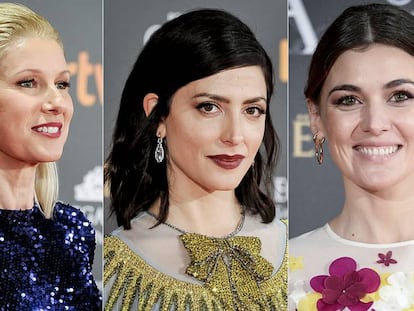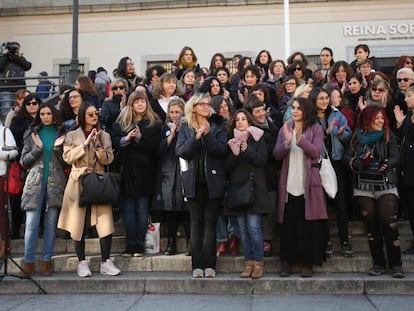Penélope Cruz: “Each case of abuse is different and should be investigated”
The Spanish actress talked about the #MeToo movement ahead of this weekend’s Goya Awards


Penélope Cruz sounded odd over the phone. “To be honest, I’m just getting over a cold, the third one I’ve had this winter,” she explained. The 43-year-old actress was in her house in Madrid, recovering ahead of the Goya awards – the interview took place on Wednesday – where she was nominated in the Best Actress category for Loving Pablo. This was her 10th Goya nomination, and although the award ultimately went to Nathalie Poza on Saturday, Cruz still has a lot to look forward to: in March she will receive an honorary César award in France, and she has a new film project coming up this summer.
Question. You are only the second Spaniard, after Pedro Almodóvar, to receive an award from the French film industry.
Answer. I am floating on a cloud. I am so happy, but a little worried because I have to deliver a speech. I want to make sure I have everything prepared so I can enjoy it. I wasn’t expecting this at all. I was shocked by the fact that Pedro was the only person who had won it for Spain. These things make me remember the people who have helped me develop my career; you live day to day, the days add up, and before you know it, years have gone by and you start to think: how is it possible that from the age of 15 I’ve been able to make a living out of this and have all these experiences? I keep learning from everything I do.
Q. You’re going through a great period in your life.
The greatest part of being able to choose my projects is having quality time with my family
A. Yes, even though my kids are young and I slowed down my pace during their first few years. Even now I don’t work at the same pace I did when I was 25 or 30, shooting film after film – practically living on a movie set. The greatest gift of being able to choose my projects is having quality time with my family and maintaining a balanced life. I stopped, I followed my heart. It’s been working out well, and I get some really interesting projects that keep me busy for about two or three months… with the exception of the movie by Asghar Farhadi [The Iranian director of Everybody Knows], which has taken four months to shoot. But it’s not like I have to be separated from my family during filming, either.
Q. And you combine that with other jobs.
A. Yes, in my production company, the collections I design with my sister Mónica, my job with Lancôme… things that allow me to calmly choose my films. As a mother, balancing work and family life is very important.
Q. You have been nominated for a Goya Award for the 10th time. Does this confirm your script choices?
A. Before being able to choose the right movies comes the good fortune of being offered these roles. Every year it is a gamble whether your movies will move audiences and industry professionals, and you have little say in the outcome. Every nomination is exciting, and of course it feels great to win, but it’ll never take away the joy you feel when you find out that you are a nominee. I always see this as a display of appreciation from my colleagues. I cry with every nomination.
Time’s Up will be a great help to men and women who have suffered from sexual harassment
Q. You’ve been there for screenings and panel discussions about your latest film, Loving Pablo. Do you always do this?
A. Since the movie has not premiered yet, we were not able to send out DVDs or internet links. This is why we’ve held all of these events… but honestly, it hasn’t been any different than previous films. We wanted the industry to see what an exceptional job all the departments did.
Q. Taking into account your rivals at the Goya Awards, do you think you’ll win?
A. I admire them all, and I am certain that I won’t win this year. I am rarely mistaken when I predict the winner, and I know perfectly well who will win this year, and I will be overjoyed for them.
Q. Are you implying that Nathalie Poza will win this year?
A. I won’t give away any names [laughs]. They all deserve the award.
Q. CIMA, The Association of Women Filmmakers in Audiovisual Media, has announced that it will be taking action at the Goya Awards to draw attention to the lack of women in the Spanish film industry. Is this the right moment to do so?
A. Yes, and this is an issue that affects all of society, not just the film industry. We are all part of the #MeToo movement, both men and women, because we all feel that rage and sense of injustice. I think the Time’s Up initiative is wonderful: I’ve donated to it because I believe it will make a difference. They have raised $17 million from donations alone from around the world, in support not just of the film industry, but any industry, and in support of both men and women – I like to stress this point – who have suffered from sexual assault, harassment, or abuse of power, and who need protection and justice. This is why we’ve created this fund.
Q. The signatories to the French manifesto are worried that this will turn into a witch hunt.
A. There is truth in both perspectives. I am with Time’s Up, a specific action that will produce specific support measures, but at the same time I still believe that every case needs to be judged on an individual basis, because every case is unique. The press must be careful not to point the finger at the wrong person. Every case deserves its own time and investigation. Otherwise, why would we have laws about this? There are legal boundaries. I believe in justice.
Q. Will your next film be Todd Solondz’s new project?
A. I hope so. It’s called Love Child. [According to the movie website IMDb, the lead character is an aspiring Broadway star who causes an accident that almost kills his abusive father, and who longs for his mother – whom he idolizes – to get involved with Nacho, who lives in the family’s guest home]. Obviously, I play Immaculada, the mother, and Edgar Ramírez plays Nacho. It will be filmed in Madrid and its surrounding areas, and if all goes well financially, we will start filming over the summer. I want to work with directors who take risks. When I got a call from Farhadi, whose work I love, and he told me he was going to create a role for me, I flipped out. Asghar is so special, so sensitive… You want to give him your all. One day I ended up in an ambulance after acting out a scene where I have a panic attack. When I got out, he hugged me, and asked me to shoot it again, which I did gladly. It has been the hardest role to play in my entire career.
Q. Will you keep doing both indie and commercial films?
A. As long as there are captivating roles, I love to work on both. Although recently I find myself leaning towards smaller budget films.
English version by Laura Rodríguez.
Tu suscripción se está usando en otro dispositivo
¿Quieres añadir otro usuario a tu suscripción?
Si continúas leyendo en este dispositivo, no se podrá leer en el otro.
FlechaTu suscripción se está usando en otro dispositivo y solo puedes acceder a EL PAÍS desde un dispositivo a la vez.
Si quieres compartir tu cuenta, cambia tu suscripción a la modalidad Premium, así podrás añadir otro usuario. Cada uno accederá con su propia cuenta de email, lo que os permitirá personalizar vuestra experiencia en EL PAÍS.
En el caso de no saber quién está usando tu cuenta, te recomendamos cambiar tu contraseña aquí.
Si decides continuar compartiendo tu cuenta, este mensaje se mostrará en tu dispositivo y en el de la otra persona que está usando tu cuenta de forma indefinida, afectando a tu experiencia de lectura. Puedes consultar aquí los términos y condiciones de la suscripción digital.









































